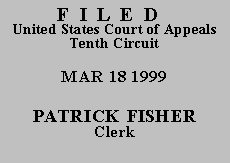

| RICHARD LYNN WRIGHT, | |
| Petitioner-Appellant, | |
| v. | |
| O. LANE McCOTTER, | |
| Respondent-Appellee. |
Petitioner Richard Lynn Wright is currently serving a sentence for aggravated robbery in the Central Utah Correctional Facility in Gunnison, Utah. He appeals the district court's dismissal of his second petition for a writ of habeas corpus filed pursuant to 28 U.S.C. § 2254.(1)
Petitioner filed his second federal habeas corpus petition on April 12, 1996, alleging two grounds for relief: (1) he was denied his Sixth Amendment right to a speedy trial; and (2) his due process rights were denied because the Ogden City magistrate judge had no authority to dismiss his criminal proceeding in 1976. The matter was referred to a magistrate judge who recommended that the petition be dismissed as successive and without merit. After reviewing objections from both Petitioner and his counsel,(2) the district court adopted the magistrate judge's recommendation and, with some additional clarification, denied and dismissed the section 2254 petition.
On appeal, Petitioner seeks a certificate of probable cause(3) from this court and essentially claims that (1) the district court incorrectly determined that there are no new or intervening facts or law that warrant review of the Sixth Amendment speedy trial claim, and (2) the court incorrectly dismissed Petitioner's due process claim because it "based its decision on an erroneous interpretation of the prior habeas decision in 1991." Appellant's Application for Certificate of Probable Cause at 2.
To obtain a certificate of probable cause, Petitioner must make a substantial showing that the district court's ruling resulted in the "denial of an important federal right by demonstrating that the issues raised are debatable among jurists, that a court could resolve the issues differently, or that the questions deserve further proceedings." Gallagher v. Hannigan, 24 F.3d 68, 68 (10th Cir. 1994) (citing Barefoot v. Estelle, 463 U.S. 880 (1983)).(4)
This court has conducted a de novo review of the briefs, Petitioner's application for a certificate of probable cause, the magistrate judge's report and recommendation, the district court's order, and the entire record on appeal. Based on that review, we conclude that the district court correctly determined that there are no new or intervening facts or law that warrant review of the Sixth Amendment speedy trial claim and that it properly dismissed Petitioner's due process claim. When Petitioner was discharged from the indictment in 1976, no criminal charges were pending against him; the criminal charges remaining were pending against Mr. Leonard Eugene Wright. In its 1991 Order, the district court stated: "Once the complaint was amended to reflect the name of Leonard Eugene Wright, the prosecution of Richard Lynn Wright effectively terminated and Richard Lynn Wright no longer stood accused." Wright, 1993 WL 18625, at **6. This statement, and the analysis underlying it, remain true today. Further, the district court did not sanction the magistrate judge's "dismissal" of the complaint against Petitioner in the 1991 Order. Instead, the court concluded that the practical result of the discharge of Petitioner from the indictment was to terminate the prosecution against him in 1976; the court only sanctioned the actual dismissal of the complaint against Leonard Eugene Wright. See id. Also of particular significance is the district court's conclusion that Petitioner's "interest in [the protections of] the right to a speedy trial was not implicated" until he learned of the charges in 1985 because he did not know that charges had been brought against him in 1976. Id. at **7. Like the panel of this court which affirmed the district court's 1991 Order, we can discern no error in any of this analysis and have found no new or intervening law or facts that change our determination.
For these reasons and for substantially the same reasons set forth in the magistrate judge's report and recommendation and the district court's orderboth of which clearly and thoroughly address Petitioner's claimswe conclude that Petitioner has failed to make the required substantial showing of the denial of an important federal right. Accordingly, we DENY Petitioner a certificate of probable cause and DISMISS the appeal.
Entered for the Court
Monroe G. McKay
Circuit Judge
*. This order and judgment is not binding precedent, except under the doctrines of law of the case, res judicata, and collateral estoppel. The court generally disfavors the citation of orders and judgments; nevertheless, an order and judgment may be cited under the terms and conditions of 10th Cir. R. 36.3.
1.The complex procedure and history of this case is clearly set forth by the district court in its Opinion and Order issued October 31, 1991, which was adopted and incorporated by this court in its decision affirming the district court's dismissal of Petitioner's first federal habeas corpus petition. See Wright v. Deland, 986 F.2d 1432, 1993 WL 18625 (10th Cir.) (Table), cert. denied, 510 U.S. 834 (1993). Since Wright was issued on January 27, 1993, Petitioner filed a second petition for relief in state trial court which was dismissed as frivolous on November 1, 1993. The Utah Supreme Court affirmed that dismissal. See Wright v. Carver, 886 P.2d 58 (Utah 1994).
2.Petitioner's appointed counsel was permitted to withdraw after perfecting the appeal but prior to briefing. Petitioner is proceeding pro se on appeal.
3.Because Petitioner filed his petition for habeas corpus before April 19, 1996, the provisions of the Antiterrorism and Effective Death Penalty Act of 1996 do not apply to this appeal.
4.This is precisely the same substantive showing that a petitioner must make under AEDPA to obtain a certificate of appealability. See Lennox v. Evans, 87 F.3d 431, 434 (10th Cir. 1996), cert. denied, U.S. , 117 S. Ct. 746 (1997) (standard for granting either certificate requires petitioner to make a substantial showing of the denial of a federal constitutional right), overruled on other grounds by United States v. Kunzman, 125 F.3d 1363, 1365 n.2 (10th Cir. 1997), cert. denied, U.S. , 118 S. Ct. 1375 (1998).